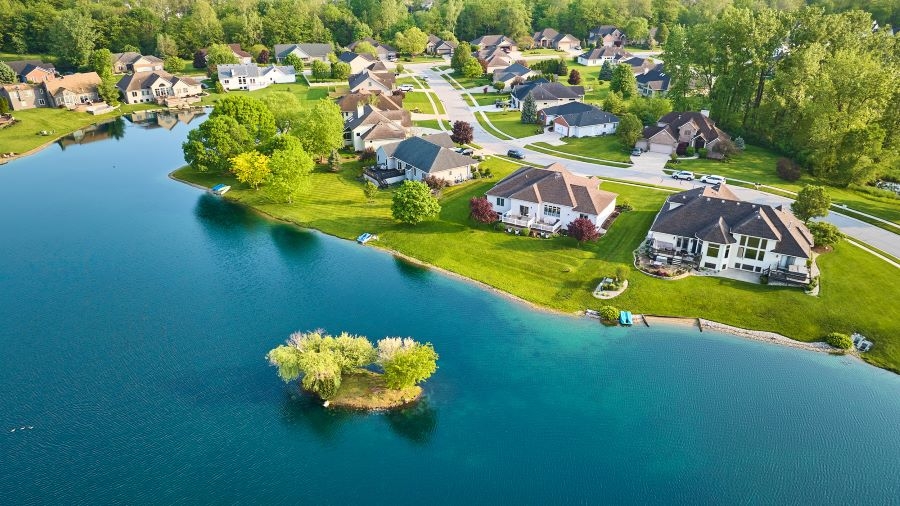Who doesn't dream of having a charming lake house to retreat to on weekends and during the summer? Lakeside living promises relaxation, beauty, and recreation right outside your door.
With miles of shoreline property across the country, lakeside real estate has become an increasingly popular, lucrative venture for individuals looking to diversify their investment portfolio or generate passive income.
Yet not all lakes or properties guarantee great outcomes. Like any investment, it comes with its own set of pros and cons. This guide will walk you through the numbers and considerations to weigh before taking the plunge into lakeside living and investing.
Potential Gains Of Lakeside Real Estate
You would surely be enticed to invest in a lakeside property given these advantages:
1. Scenic Views And Recreation
Lakeside homes, like those in Lake St. Louis, provide beautiful, relaxing scenery and easy access to popular water activities like fishing, boating, swimming, and watersports. This makes them highly attractive for personal and rental use for those seeking an aquatic lifestyle.
2. Higher Demand
The desirability of lakeside living leads to high demand, especially in regions with large inland populations looking for second homes within driving distance.
Demand is projected to increase as working remotely becomes more common. High demand enables steady price appreciation.

3. Tourism/Vacation Rentals
Many lakeside communities rely on tourists and seasonal occupants, especially in premiere vacation destinations. Investors can generate substantial rental income during summer peaks. Prime properties rent out weeks in advance.
4. Development Opportunities
As demand rises for lakeside living, ample opportunities exist to build new residences and mixed-use properties to sell or rent at top dollar. However, zoning restrictions can limit some development options.
5. Appreciation In Value
Lakeside properties have the potential to appreciate over time. By investing in a desirable location and maintaining the property, you can benefit from capital appreciation.
Studies show that Lakeside homes and waterfront properties have higher prices than average land properties. Issues with scarcity and high demand drive these returns.
Challenges Of Lakeside Real Estate
Investing in lakeside real estate may have a handful of advantages, but it's crucial to check its downsides as well.
1. Regulatory Restrictions
Environmental rules and zoning provisions strictly govern development/modification to protect lake quality. Investigating and complying with regulations adds complexity and project costs. Violations can force reversions or evictions.
2. Environmental Risks
Rising sea levels, erosion, flooding events, and the impact of motorized watercraft all pose threats. Mitigating measures (seawalls, dredging, etc.) and insurance add expenses. Water quality issues can impact desirability.
3. Seasonal Demand Swings
Besides premier year-round lake destinations, many areas rely heavily on warmer months for tourism. Off-season occupancy plunges. Investors must account for large revenue fluctuations across seasons.
4. High Maintenance Costs
From landscaping and lawn care to sealing outdoor wood surfaces, lakeside homes require extra upkeep to prevent water damage and shore erosion, adding costs for owners and investors.
5. Market Sensitivity
Like all real estate, lakeside markets endure cyclical swings, and economic events can quickly dampen demand and pricing. Underperforming inland regions, in particular, impact second-home investment performance.
Tips For Investing In Lakeside Properties
Apart from knowing the pros and cons of having a lakeside property, here are some of the tips that can help you decide if this is a worthwhile investment.
• Location is key when picking a lakeside investment property. Target premier lakeside markets that maintain high property valuations even in economic downturns.
• Conduct an environmental assessment to gauge risk levels and gauge the property's resilience over the longer term. Assess susceptibility to flooding, shore erosion, storm surges, and other climate change impacts. Consider long-range forecasts and plan for appropriate mitigation factors.
• Hire qualified home inspectors with lakeside property expertise to thoroughly examine any prospective investment's structural and systemic integrity. Assess the condition of docks, foundations, pipes, and seawalls. Budget for near-term recommended maintenance and repairs accordingly.
• Research the Property. Before investing in a lakeside property, conduct thorough research on the property and the surrounding area. Consider factors such as the shoreline, water level history, view across the lake, accessibility, and noise levels.
• Assess Your Financial Situation. Investing in lakeside properties requires significant upfront capital. Evaluate your budget, credit, and debt-to-income ratio to gauge your financial standing. Additionally, consider the costs of property maintenance, insurance, and taxes.
Final Thoughts
At the end of the day, owning a vacation home or income property on a lakeside can be a savvy move that pays you back in enjoyment and financial gains. While lakeside investing isn't for everyone, it's in high demand for good reason—beautiful views, access to water sports, and tranquility are hard to beat.
If you're considering buying a lake property, doing lots of research is necessary. Make sure you look into everything to decide if a lakeside real estate fits your financial capability and the lifestyle you want. It's better to spend your hard-earned money on a property that's well-thought-of.





